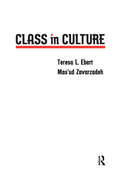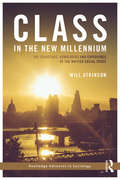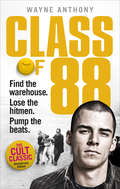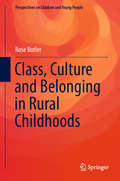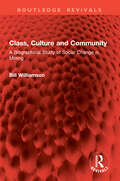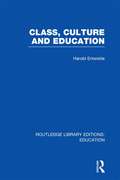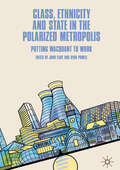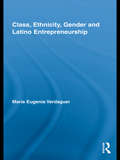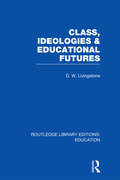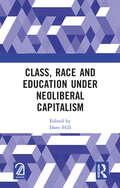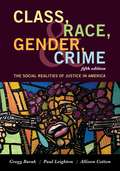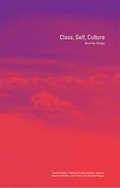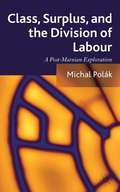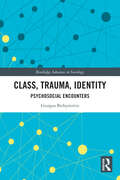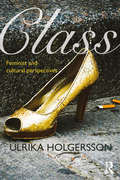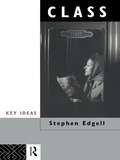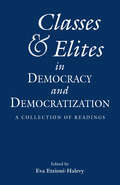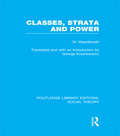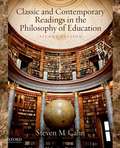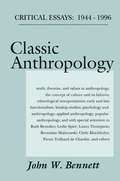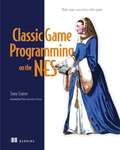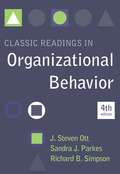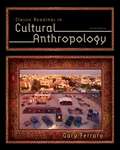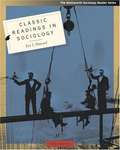- Table View
- List View
Class in Archaic Greece
by Peter W. RoseArchaic Greece saw a number of decisive changes, including the emergence of the polis, the foundation of Greek settlements throughout the Mediterranean and Black Sea, the organisation of panhellenic games and festivals, the rise of tyranny, the invention of literacy, the composition of the Homeric epics and the emergence of lyric poetry, the development of monumental architecture and large scale sculpture, and the establishment of 'democracy'. This book argues that the best way of understanding them is the application of an eclectic Marxist model of class struggle, a struggle not only over control of agricultural land but also over cultural ideals and ideology. A substantial theoretical introduction lays out the underlying assumptions in relation to alternative models. Material and textual remains of the period are examined in depth for clues to their ideological import, while later sources and a wide range of modern scholarship are evaluated for their explanatory power.
Class in Culture (Series in Critical Narrative)
by Teresa L. Ebert Mas'Ud Zavarzadeh"A gem of a book. Its topics are timely and provocative for cultural studies, sociology, English, literary theory, and education classes. The authors are brilliant thinkers and clear, penetrating writers." -Peter McLaren, UCLA, author of Capitalists and Conquerors: A Critical Pedagogy Against Empire Class in Culture demonstrates the power of moving beyond cultural politics to a deeper class critique of contemporary life. Making a persuasive case for class as the material logic of culture, the book is written in a double register of short critiques of life practices-from food and education to race, stem-cell research, and abortion-as well as sustained critiques of such theoretical discourses as ideology, consumption, globalization, and 9/11. Surpassing the orthodoxies of cultural studies, Class in Culture makes surprising connections among seemingly unrelated cultural events and practices and offers a groundbreaking and complex understanding of the contemporary world.
Class in the New Millennium: The Structure, Homologies and Experience of the British Social Space (Routledge Advances in Sociology)
by Will AtkinsonClass in the New Millennium paints a fresh and comprehensive picture of social class in Britain today. Anchored in a broad repertoire of methods and pursuing a distinctive theoretical agenda, it not only painstakingly maps the structure, transformation and effects of the UK’s key fault lines but goes behind closed doors to see how they play out in everyday family life. Throughout the book Atkinson throws new light on a diverse array of themes, including: the continued effects of deindustrialisation, educational expansion, feminisation of the workforce and surging employment insecurity; the persistence of lifestyle cleavages despite cultural and technological change; the growth of political disengagement, the transformation of the Labour Party and the rise of nationalism; the entwinement of class with space, place and physical movement; and the way in which class interacts with intimate relations to shape not just the way we decorate our walls or talk over the dining table but the very reproduction of the class structure itself. This innovative title will appeal to scholars as well as advanced undergraduate and postgraduate students interested in the fields of sociology, politics and political science, cultural studies, cultural geography, social policy and social work.
Class, Culture and Belonging in Rural Childhoods (Perspectives on Children and Young People #7)
by Rose ButlerThis book explores how rural children negotiate economic insecurity and difference. Based on long-term ethnographic research in rural Australia, it shows that children draw on class-based ideas of moral worth, anchored in racialised and gendered understandings, to negotiate financial hardship and insecurity. Through close observations in the classroom, school yard and the home, and interviews with diverse young people, their parents and teachers, Class, Culture and Belonging in Rural Childhoods takes us deep into children’s everyday struggles and their efforts to manage insecurity and belonging within a polarised economic landscape. This book offers compelling new analysis of children’s experiences at a time of rapid and far-reaching change in rural communities and the world at large. This unique and engaging ethnography of rural Australia makes an important and timely contribution to wider understandings of how children navigate the precarious circumstances of the present.
Class, Culture and Community: A Biographical Study of Social Change in Mining (Routledge Revivals)
by Bill WilliamsonFirst published in 1982, Class, Culture and Community (now with a new preface by the author) is a biographical study of class, culture, and community in a mining village based on the life of one man, a Northumberland pitman and the author’s grandfather. It traces some of the principal social changes in British society in the twentieth century and raises issues which are central to an understanding of the sociology of modern Britain.The mining village, Throckley, in which James Brown lived, was part of the Northumberland coalfield. The author describes it as a ‘constructed community’, with two historical impulses giving shape to its principal institutions—the capitalist drive for profit from pits, and the efforts of organized labour for a better standard of life. He shows how the Throckley coal company built up a village, but shows that so, too, did the Throckley miners themselves; the class relationships of the village are discussed in these terms.The life story at the heart of the book illustrates how processes of the social construction of community arise from the compelling activities of everyday life and how from these, in their turn, arise the institutions of organized labour itself. Culture and community are discussed as questions of identity, social recognition, and shared understanding. None of these is static: their changing meanings through war and industrial struggle are described here in the life of a single man and his family.
Class, Culture and Education (Routledge Library Editions: Education)
by Harold EntwistleThis book examines the concepts of equality, class, culture, work and leisure and explores their interrelationship through the discussion of some current problems, especially the problems posed for schools for the ‘culturally deprived.’ The debate about differential provision of schooling for different social groups is taken up through examination of the assumption that schools are middle-class institutions, and the claims and counter claims about the possibility of there being a common culture as the basis for a common curriculum in comprehensive schools. The concept of culture and, especially the meaning of working-class culture receives examination in this context as well as the thesis that any sub-culture constitutes an adequate or valid way of life.
Class, Ethnicity and State in the Polarized Metropolis: Putting Wacquant to Work
by John Flint Ryan PowellLoïc Wacquant is one of the most influential sociological theorists of the contemporary era with his research and writings resonating widely across the social sciences. This edited collection critically responds to Wacquant’s distinct approach to understanding the contemporary urban condition in advanced capitalist societies. It comprises chapters focused on Europe and North America from leading international scholars and new emergent voices, which chart new empirical, theoretical and methodological territory. Pivoting on the relationship between class, ethnicity and the state in the (re-)making of urban marginality, the volume takes stock of Wacquant’s body of work and assesses its value as a springboard for rethinking urban inequality in polarizing times. Heeding Wacquant’s call for constant theoretical critique and development in understanding dynamic urban relations and processes, the contributions challenge, develop and refine Wacquant’s framework, while also synthesizing it with other perspectives and bringing it into dialogue with new areas of inquiry. How can Wacquant’s work aid the empirical understanding of today’s complex urban inequalities? And how can empirical investigation and theoretical synthesis aid the development of Wacquant’s framework? The diverse contributors to the collection ask these, and other, searching questions – and Wacquant responds to this critique in the final chapter. This book will be of interest to scholars engaged in understanding the drivers, contexts, and potential responses to contemporary urban marginality.
Class, Ethnicity, Gender and Latino Entrepreneurship
by María Eugenia VerdaguerDrawing on surveys and in-depth interviews, this book examines the social and economic relations of first-generation Latino entrepreneurs. Verdaguer explores social patterns between and within groups, situating immigrant entrepreneurship within concrete geographical, demographic and historical spaces. Her study not only reveals that Latinos' strategies for access to business ownership and for business development are cut across class, ethnic and gender lines, but also that immigrants' options, practices, and social spaces remain largely shaped by patriarchal gender relations within the immigrant family, community and economy. This book is a necessary addition to the literature on immigration, class, gender relations, and the intersectionality of these issues.
Class, Ideologies and Educational Futures (Routledge Library Editions: Education)
by D W. LivingstoneThis book provides a systematic and detailed analysis of class relations in advanced capitalist societies as a basis for understanding both class differences in educational practices and the relative effects of class and other social background factors on public attitudes toward education. Secondly, the book offers an empirically-grounded summary of the contending educational ideologies in advanced capitalism, through a discourse analysis of the public statements of spokes-persons for major class groupings. Thirdly, using the data from several public opinion surveys in Ontario, profiles of public attitudes on critical education issues are interpreted in terms of the actual effects of class and other social background factors, as well as the mediating influences of contending ideologies. Finally a general approach and array of tactics for creating practical alternative educational and social futures are illustrated through the book.
Class, Race and Education under Neoliberal Capitalism
by Dave HillWith the onset of Austerity Capitalism and Immiseration Capitalism, and with the increasing commodification, marketisation and privatisation of society and of education, Marxist Theory and Marxist Education Theory have taken on a new urgency.In this collection of essays, written from a classic Marxist perspective, Dave Hill lays bare how the capitalist class in the knowledge industry/academia, use ideological (and repressive) state apparatuses, such as education, to divide, disarm and demoralise critical, Marxist analysis and activism.This title is co-published with Aakar Books. Print edition not for sale in South Asia (India, Sri Lanka, Nepal, Bangladesh, Pakistan and Bhutan)
Class, Race, Gender, and Crime: The Social Realities of Justice in America
by Paul Leighton Gregg Barak Allison CottonClass, Race, Gender, and Crime is a popular, and provocative, introduction to crime and the criminal justice system through the lens of class, race, gender, and their intersections. The book systematically explores how the main sites of power and privilege in the United States consciously or unconsciously shape our understanding of crime and justice in society today. <P><P>The fifth edition maintains the overall structure of the fourth edition—including consistent headings in chapters for class, race, gender, and intersections—with updated examples, current data, and recent theoretical developments throughout. This new edition includes expanded discussions of police violence and the Black Lives Matter movement, immigration, and queer criminology.
Class, Self, Culture (Transformations)
by Beverley SkeggsClass, Self, Culture puts class back on the map in a novel way by taking a new look at how class is made and given value through culture. It shows how different classes become attributed with value, enabling culture to be deployed as a resource and as a form of property, which has both use-value to the person and exchange-value in systems of symbolic and economic exchange.The book shows how class has not disappeared, but is known and spoken in a myriad of different ways, always working through other categorisations of nation, race, gender and sexuality and across different sites: through popular culture, political rhetoric and academic theory. In particular attention is given to how new forms of personhood are being generated through mechanisms of giving value to culture, and how what we come to know and assume to be a 'self' is always a classed formation. Analysing four processes: of inscription, institutionalisation, perspective-taking and exchange relationships, it challenges recent debates on reflexivity, risk, rational-action theory, individualisation and mobility, by showing how these are all reliant on fixing some people in place so that others can move.
Class, Surplus, and the Division of Labour: A Post-Marxian Exploration
by Michal PolákThe traditional Marxian picture of a two-class polarisation seems far removed from today's diverse society. Re-examining the very foundations of the Marxian theory in the process, the author argues that important critiques can fruitfully be understood and to accomplish the goal, he extends the traditional concepts in innovative and original ways.
Class, Trauma, Identity: Psychosocial Encounters (Routledge Advances in Sociology)
by Giorgos BithymitrisThis book is a dialectic and multi-perspective examination of classed traumas in late modernity. The primary anchoring question is whether and how class becomes a condition of possibility for coping with traumas. What does it mean to experience deindustrialization, crises, or domestic violence from a specific class position? Do the coping mechanisms differ along the lines of class, gender, race, age, or ethnicity? The text negotiates such questions, travelling back and forth from psychoanalysis to sociology and from the global to the local, while critically engaging with memories, narratives, and myths engraved into social and personal histories. Through a dialogic quest for what is silenced, and what is salient within oral, written, and visual testimonies, it foregrounds what the upper classes prefer to neglect: the traumatizing core of the new class divide. Rather than idealizing or vilifying the dominated, this study calls for an exploration of practices, narrations, and spaces whereby alienation and integration co-exist antagonistically, producing hybrid and fragmented, but also potentially transformative, subjectivities. This book will be of interest to scholars of humanities and social sciences, primarily for those studying social stratification and inequalities, sociology of emotions, identity theory, trauma and memory, political psychoanalysis, labour history, and ethnography.
Class: Feminist and cultural perspectives
by Ulrika HolgerssonThere is hardly any discussion of class that does not in some way relate to the theories of Marx and Weber. So profound was the impact of their ideas, that their writings are often perceived as the only original and most reliable interpretations of class society. But Marx and Weber were neither the first, nor last, to talk about class and they did so based on the specific conditions prevalent in their own communities. ‘Class’ explains this complex field using cultural, sociological and feminist perspectives. It deepens our understanding of the problems of class and uses illuminating examples from media, popular culture and literature that explain current class analysis. ‘Class’ is an ‘elegant, lucid comprehensive introduction’ that broadens our understanding of the concept and the immense power that it exerts by way of in- and exclusions.
Class: Key Concept in Sociology
by Stephen EdgellThis succinct introductory text argues that class remains a key concept in sociology. The author examines the classic contributions of Marx and Weber and the recent works of Wright and Goldthorpe. The book provides students with an accessible review of class structures, social mobility, inequality, politics and the potential classlessnes of Britain and America.
Classes and Elites in Democracy and Democratization: A Collection of Readings (Sociology/Psychology/Reference)
by Eva Etzioni-HalevyThis collection of readings has been complied on the assumption that for an adequate explanation of the success and failure, the strengths and weaknesses, of democracy, it is necessary to resort to both class and elite theories and to strive for the future development of the extant beginnings of a synthesis between them. For this purpose, it presents the most central and intellectually outstanding readings that illustrate the manner in which the two theories have analyzed democracy, as well as democratization, in various parts of the world.
Classes, Strata and Power (Routledge Library Editions: Social Theory)
by Wlodzimierz WesolowskiProfessor Wesolowski presents a detailed study of Marx's theory of class structure and compares it with non-Marxist theories of social stratification, in particular the functionalist theory of stratification and the theory of power elite. He is also concerned to develop and extend the Marxist approach to the study of class structure and social stratification in a socialist society. The book begins with a thorough and original reconstruction of Marx's theory of class domination in a capitalist society, and goes on to show that contemporary non-Marxist theories of power elites complement rather than contradict Marx's concept of class domination. The author examines in detail the functionalist theory of stratification, but rejects it, preferring the Marxist approach. Finally, though, he demonstrates the complementary nature of the two approaches to the study of class structure by expounding a comprehensive paradigm for empirical research based on Marxist theory but including some elements of contemporary stratification theories as well.
Classic And Contemporary Readings In The Philosophy Of Education
by Steven M. CahnNow even more affordably priced in its second edition, Classic and Contemporary Readings in the Philosophy of Education is ideal for undergraduate and graduate philosophy of education courses. Editor Steven M. Cahn, a highly respected contributor to the field, brings together writings by leading figures in the history of philosophy and notable contemporary thinkers. The first section of the book provides material from nine classic writers: Plato, Aristotle, Locke, Rousseau, Kant, Wollstonecraft, Mill, Whitehead, and Dewey. Their historically important works encourage students to view current issues and debates from broad perspectives. The second section presents twenty-one recent selections that reflect diverse approaches, including pragmatism, analytic philosophy, feminism, and multiculturalism. The readings are substantial or complete texts, not fragments. The second edition of Classic and Contemporary Readings in the Philosophy of Education features expanded selections by Locke, Rousseau, Kant, and Dewey, along with eight new readings: * Mary Wollstonecraft, "A Vindication of the Rights of Woman" (excerpt) * Patricia Heidenry, "Home Is Where the School Is" * Joseph S. Spoerl, "Justice and the Case for School Vouchers" * Jeffrey R. Henig, "Rethinking School Choice" * John Passmore, "The Concept of Teaching" * Michel Foucault, "Discipline and Punish" (excerpt) * Steven M. Cahn, "Guiding, Grading, and Guarding" * Martha Nussbaum, "Cultivating Humanity" (excerpt) Offering unprecedented breadth and depth of coverage, Classic and Contemporary Readings in the Philosophy of Education, Second Edition, is the most inclusive, thorough, and accessible introduction to the field.
Classic Anthropology: Critical Essays, 1944-96
by John W. BennettClassic anthropology is Bennett''s label for the work produced by anthropologists between 1915 and 1955. In this book, Bennett criticises classic anthropology for ne glecting the contemporary world and modern societies. '
Classic Game Programming on the NES: Make your own retro video game
by Tony CruiseBuild your own retro games for the Nintendo Entertainment System.Do you have an amazing idea for a NES game you&’ve been itching to turn into reality? Classic Game Programming on the NES will show you how. This all-practical beginner's guide is full of step-by-step guidance on everything from graphics and music, to enemy AI, to the 6502 Assembler language you need to get the most out of the NES. Inside Classic Game Programming on the NES you&’ll learn how to: Use the 6502 Assembler language to create your own game Create and display tile and sprite graphics Play sound effects and music Program enemy AI Balance cycle times and memory usage Design and develop your own action game from scratch When you&’re developing retro games, it&’s dangerous to go alone—so take this essential guide! Classic Game Programming on the NES is an all-in-one handbook to the resources you need to start building for the NES. You&’ll learn to understand modern emulators and discover the secrets of programming in ages past. Best of all, you won&’t need any specialist experience! Even highly technical elements are broken down into step-by-step instructions, and fully illustrated with easy-to-follow diagrams. Foreword by Philip and Andrew Oliver. About the technology Nintendo Entertainment System (NES) games like Super Mario Bros and The Legend of Zelda shaped the video game industry and defined childhood for millions of gamers worldwide. Bring back the magic by creating your own NES games! All you need is this book and your imagination––no game dev experience or specialist programming skills required. About the book Classic Game Programming on the NES distills the scattered secrets of NES development into clear instructions for building your first games for the Nintendo Entertainment System. You&’ll learn about the NES&’s unique design, the surprisingly simple 6502 Assembly language, and more. As you go, you&’ll create a simple space-based shoot-em-up that gives you a pattern you can follow to build anything you can dream up on your own. What's inside The tools of NES game development Create and display tile and sprite graphics Sound effects and music Program enemy AI About the reader No game programming experience required. About the author Tony Cruise is a legend in the field of retro games. In the 80&’s he programmed games for 8-bit systems; now he creates resources for developers working with 8 and 16-bit systems. The technical editor on this book was Dan Weiss. Table of Contents 1 Let&’s program games! 2 Getting set up 3 Starting 6502 Assembler 4 Math, loops, conditions, and bits 5 Starting somewhere 6 Starting a game 7 Move and shoot 8 Enemy movement 9 Collision detection 10 Keeping score 11 Player collisions and lives 12 More enemies 13 Animations and more 14 Sound effects 15 Music 16 Where to from here?
Classic Readings In Organizational Behavior
by Richard Simpson J. Ott Sandra ParkesCLASSIC READINGS IN ORGANIZATIONAL BEHAVIOR is organized around the field's most discussed themes: leadership, motivation, teams and groups, effects of the work environment, power and influence, and organizational change. Within each of these thematic sections, the readings are presented chronologically so students can better understand the development of specific theories, as well as the overall development of the field of organizational behavior. Because of this effective organization and a thorough introduction, many instructors use this reader as the sole text for their courses.
Classic Readings in Cultural Anthropology
by Gary FerraroPractical and insightful, CLASSIC READINGS IN CULTURAL ANTHROPOLOGY is a concise, inexpensive, and accessible reader that presents core historical and contemporary works that have been instrumental in shaping anthropological thought and research over the past decades. Carefully edited by author Dr. Gary Ferraro, the text includes classic readings from the disciplines of cultural anthropology and linguistics. Selected from scholarly works on the basis of their enduring themes and contributions to the discipline, these eminently relevant selections enable you to further explore anthropological perspectives on such key topics as culture; language and communication; ecology and economics; marriage and family; gender; politics and social control; supernatural beliefs; and issues of culture change. By providing this wide array of classic reading on foundational topics, this book delivers an excellent introduction to the field of cultural anthropology and the contributions it makes to understanding the world around us.
Classic Readings in Sociology
by Eve HowardCollection of important readings in the field of sociology.

